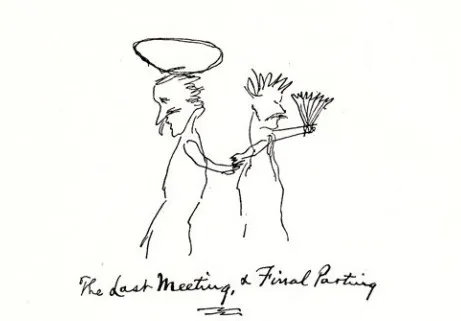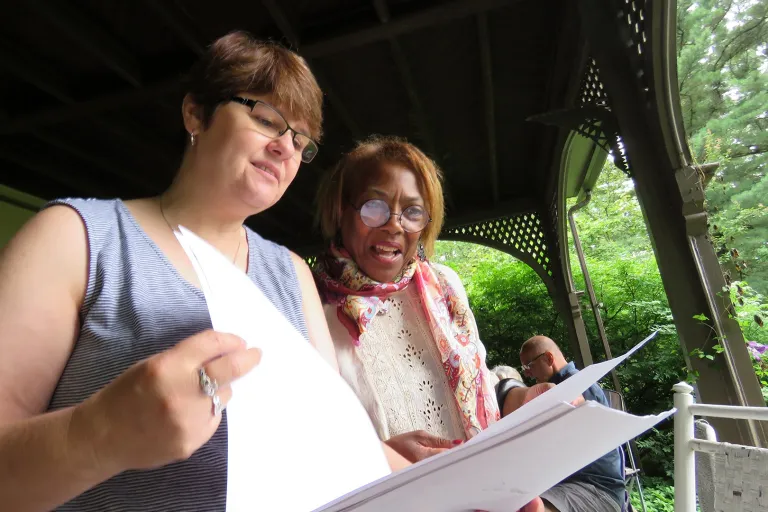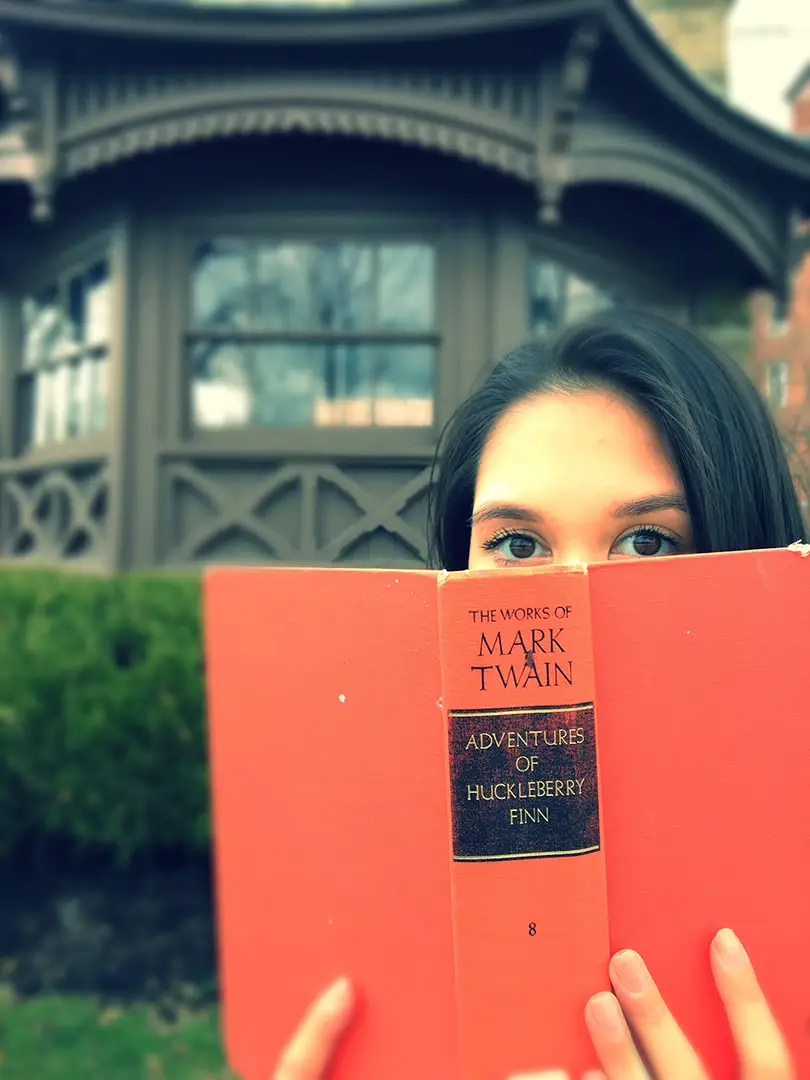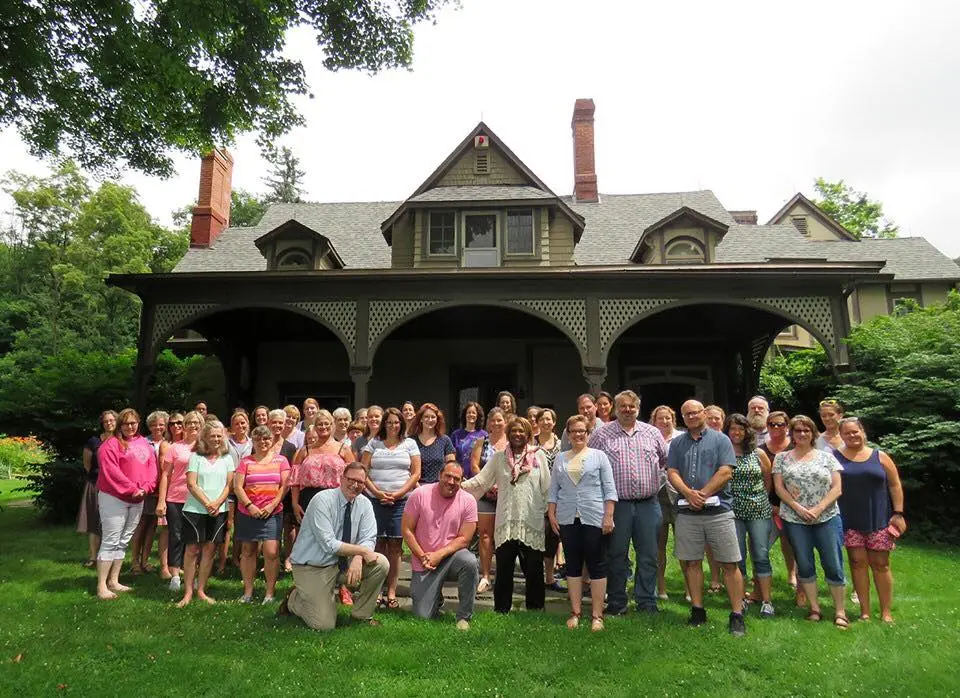
Summer Teachers Institute
Elmira College is the perfect place to “talk Twain,” since it is the home of the international Center for Mark Twain Studies. The Center has stewardship of Quarry Farm, the summer home of Olivia Langdon Clemens’ family and site of her sister Susan Crane’s home. Quarry Farm also includes the original location of the Study as well as the landmark home where Clemens wrote and first read many of his iconic writings to his family while on the porch at “the Farm.”
“The Man That Corrupted Hadleyburg”
In lieu of the intensive, two-day institute, this year we will be hosting a single hour-long virtual seminar. The seminar will take place on Wednesday, July 19 at 10:00 AM Eastern. It will be hosted via Zoom and open to teachers at all levels, including pre-service, as well as librarians, curators, school administrators…anybody interested in the integration of Twain into educational environments. While time will be set aside for discussing Twain’s place in curricula and fielding questions from participants on any topic, the centerpiece of the seminar will be a “target text,” one which may or may not be familiar to participants, but which we think is appropriate for a variety of pedagogical situations.
The target text for 2023 is Twain’s “The Man That Corrupted Hadleyburg,” a short story which first appeared in Harper’s Monthly in December of 1899 (see text embedded below). Once a fixture of U.S. literature anthologies, in the story Twain takes a characteristically dim view of human nature and American institutions. Though some scholars have claimed that Hadleyburg is thinly-veiled stand-in for towns Twain actually visited, the story has the potential to resonate with contemporary students, especially with its themes of political division, unreliable sources, and cycles of betrayal and revenge.
“Mark Twain Under Assault: What Do We Do Now?”
Over the past year educators, especially those at K-12 public schools, have been further beleaguered by renewed partisan campaigns, propagandizing, and panic-mongering about texts (and contexts). Mark Twain is one of many authors whose works have been targeted for censorship from curriculums and library collections. In this year’s STI, we will lean on Twain as a case study of literary censorship, as we grapple with strategies for teaching under conditions of heightened scrutiny, tension, and rapid, unsettling change.
Recognizing the multifold ongoing mass traumas of the current moment and in hopes of hosting candid conversations between teachers which might prove both cathartic and generative, we will be severely limiting the size of the Institute this year. It will be in-person on the Elmira College campus and the grounds at Quarry Farm, but participation will be by invite-only through professional member organizations like NCTE, BOCES, etc. If you are an educator who would is interested in attending, but has not received an invitation, you may inquire to Tw*********@****ra.edu about availability (please tell us something about yourself and your interest in the event).
2021 Summer Teachers Institute
“The Journey Motif: Mark Twain and Poetry”
Mark Twain identified as a poet, a bad poet. “When the great poet laureate, Lord Tennyson, died,” Twain wrote, “I found that his position was open and I tried to get it…but I did not get it…It is a very difficult task making the second line rhyme with the first.”
All joking aside, Twain really did frequently and enthusiastically experiment with verse. He read and recited poetry with friends and family. He composed short poems, both serious and silly, to be included in letters and telegrams. He wrote and fastidiously revised poems in his journals and notebooks, even though many of them never made their way to publication. And he sometimes used poetry, both his own compositions and lines written by others, to punctuate his speeches.
Twain’s relationship to poetry reveals a lot about how poetry circulated in the nineteenth-century United States. In what follows, we provide and contextualize two of Twain’s poems, “Genius” and “These Annual Bills,” which we think can be productively scaffolded into teaching units build around one of the most popular poems in the Common Core, Robert Frost’s “The Road Not Taken.”

2020 Summer Teachers Institute
“The New Normal: The Past Speaking to Our Student’s Present”
Before any book or story appears in print—traditionally, digitally, audial—the author exists—breathes, lives, experiences, witnesses life all round. Every author takes in life—recording, listening, jotting notes, even actively participating in it—nothing is lost; nothing is not appreciated. Authors’ letters, journals, notes, for example, lend insight into their world and its times: social, cultural, political, and yes, even moments in life when health crises affect them and the time around them. From the Greeks to the present, authors have used health crises to their audience—present and future—to identify with and better understand how to make meaning of and from their “here and now.”
Mark Twain is no exception. Health issues and challenges followed Mark Twain and his family, as well as America during Twain’s lifetime.
The 2020 Institute sought to enable students to understand that what they have been experiencing, feeling, and fearing during COVID-19 is not singular, a “thing” that makes them different and alone. Health crises and issues from those arising during the Cvil War all the way to the present work their way into the fiction and nonfiction of our authors. Aligned with the current pandemic, the Institute will explore the killing of Mr. George Floyd and the ensuing massive protests in all 50 states – protests that have included so many of our students while the pandemic rages on.
The instructional aim here is not only to illustrate how Mark Twain and Samuel Clemens confronted and dealt with these challenges but also to examine and explore with our students how we as a nation had and are continuing to confront and deal with such challenges—from the illness or virus itself, to how day-to-day living and interacting and once-taken-for-granted routines and assumptions can suddenly, without warning not only change but potentially dissolve before our eyes.
In addition, teachers worked on and created several Interactive Student Activities (from elementary to high school) which they can take directly into their classrooms and on which they can build additional instructional lessons and activities, as well as scaffold other texts, both fiction and nonfiction.
Resources associated with the 2020 Institute include:
- Instructional modules on Mark Twain and typhoid fever, Mark Twain and the San Francisco police, Mark Twain’s view of history, and civil disobedience in Elmira. These modules come with short videos, an assortment of primary resources, and suggested Common Core pairings
- Instructional exemplars for the Pre-K to 12th grade classrooms with primary and secondary resources suggestions
- Video archive of the entire 2020 Summer Teachers Institute

“Mark Twain and Generation Z”
The aim of the 2019 Summer Teachers Institute was to explore, discover, and reflect on how Mark Twain reads and speaks to this generation of students – Generation Z. In addition, the Institute examined how educators can leverage and realign what Mark Twain/ Samuel Clemens wrote that elucidates our students’ here and now from a “safe-literary distance” of both his nonfiction and fiction.
Resources associated with the 2019 Institute include:
- An Institute reader with a large number of primary and secondary sources
- Teaching resources associated with Mark Twain in Elmira, Mark Twain’s Memorization Strategies, and Teaching with Sensitive Texts
- A Recap of the 2019 Summer Teachers Institute can be found HERE.

